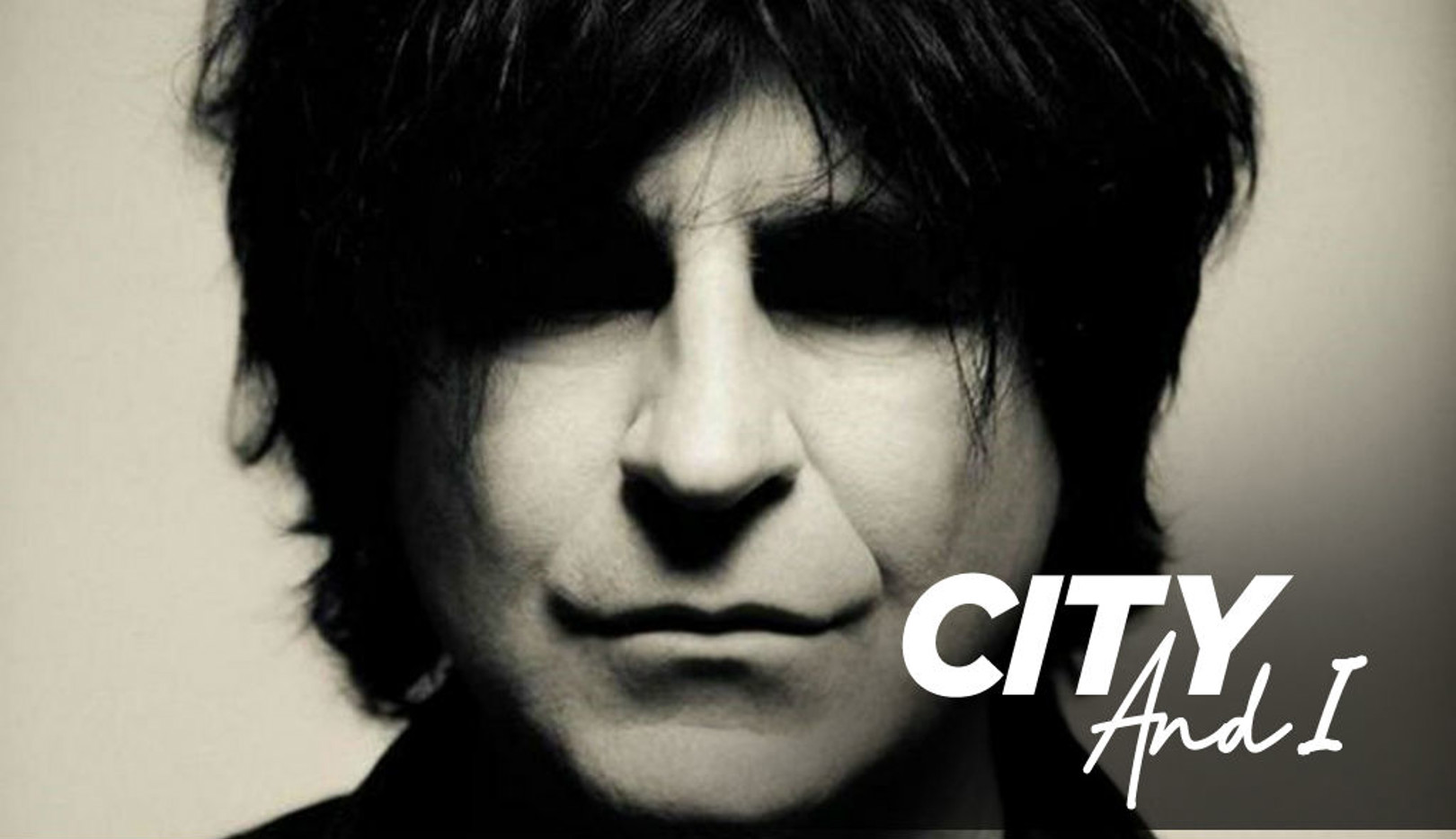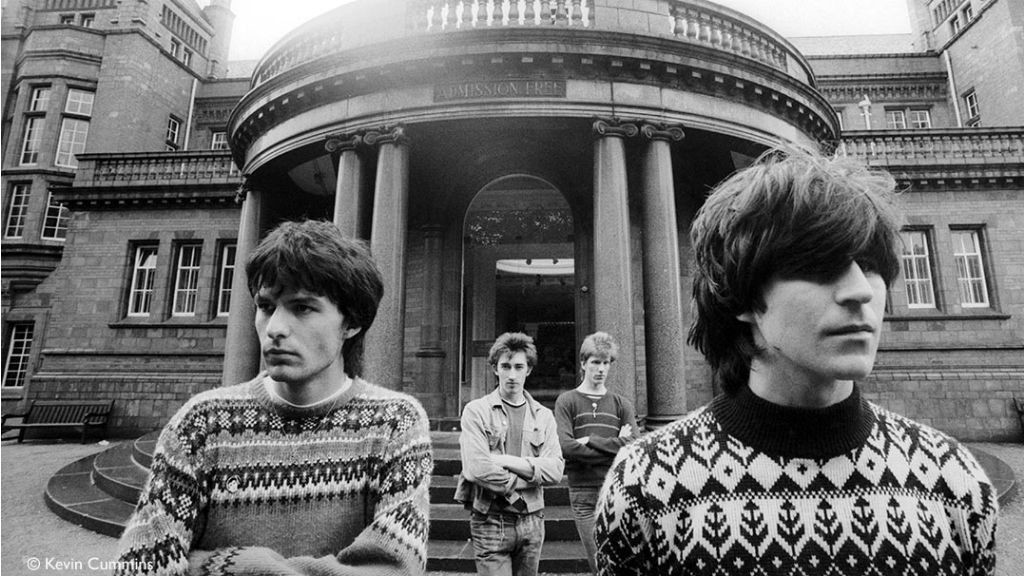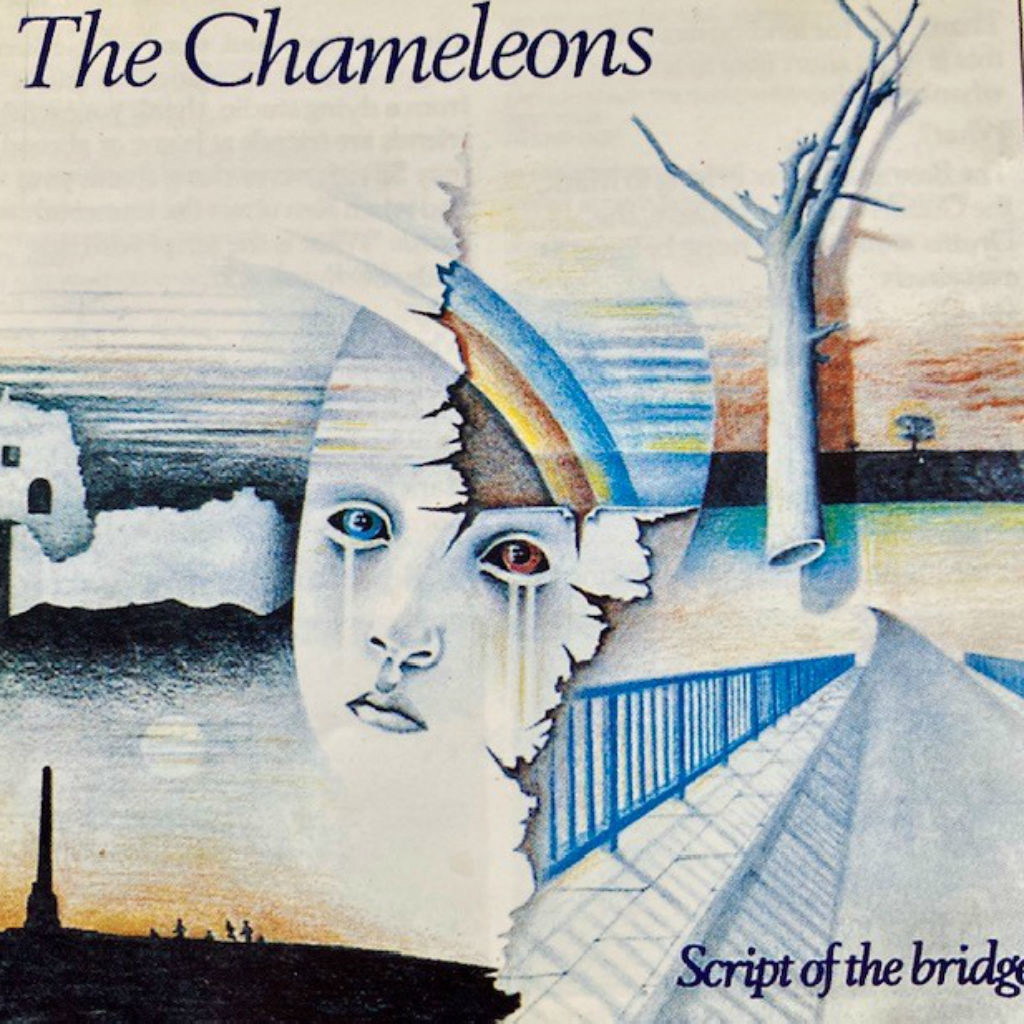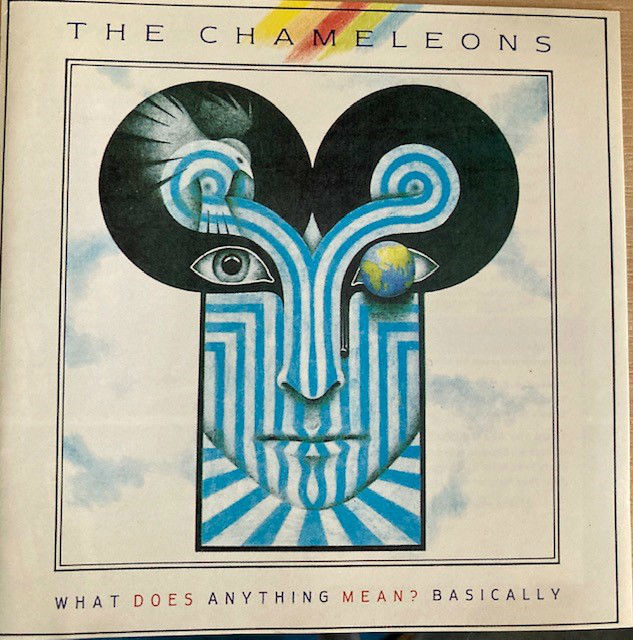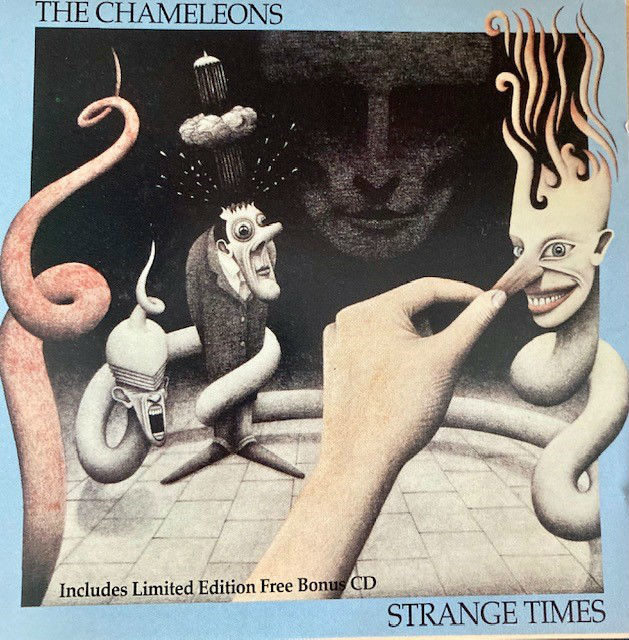Music and Manchester City have, of course, long been inextricably linked.
From Oasis’s Gallagher brothers, Johnny Marr of the Smiths, Doves through to Blossoms, – the lineage linking Manchester musicians and City is both long and illustrious.
But few have as rich and an indelible association with the Club as Mark Burgess, bassist, singer and lyricist with The Chameleons – one of the most acclaimed and influential groups to ever come out of Manchester.
CITY+ | Sign up to access exclusive content
Hailing from Middleton, North Manchester, over the course of three ground-breaking albums released between 1983 and 1986 – Script of the Bridge, What Does Anything Mean Basically and Strange Times – The Chameleons established a reputation for being one of the post-punk scene’s most innovative and distinctive bands.
Backed by a devoted domestic and international following, The Chameleons appeared to be on the cusp of sustained mainstream success when, following the death of manager Tony Fletcher, they broke up in 1987.
It was a sad end for a group who had brought so much to Manchester’s rich musical heritage.
Yet, if anything, in the intervening 30 years, the Chameleons’ impact and reputation has only increased in stature.
For one, Burgess’s lyrical themes of alienation, isolation and the struggle for individual freedoms have arguably never been more pertinent.
What’s more, the band’s unique blend of powerful melody and yearning melancholy still resonates today in the music of groups as diverse such as Interpol, Arcade Fire, Editors and The National to name but a few while Noel Gallagher last year referenced Strange Times as one of his own defining albums.
After The Chameleons made successful but brief reformation between 2000 and 2003, Burgess, under the guise of Chameleons Vox, has since continued to tour across the globe to widespread acclaim with the band playing a sold-out show at the Ritz last December prior to the COVID-19 pandemic.
DONATE NOW | Cityzens Giving for Recovery
But though music has been the driving force of his life, Mark’s passion for City has been his other defining focus.
Burgess has followed the Club’s many fortunes religiously from an early age and travelled to support City home and away for many years, especially in the 1970s before his music career took precedence.
Uniquely, his passion for the Club also saw Mark take up a office-based managerial role with City’s ticketing department at Maine Road in the late 1990s when he briefly took a back seat from music.
Nowadays, Mark mainly lives in the United States but still attends City games whenever his schedule allows.
And, over the course of a wide-ranging interview about his enduring love for the Club, he revealed how his passion for City was infused in the blood from an early age, thanks to the guiding influence of his dad, Albert.
“I’ve followed City for 53 years now. I first went in 1967 we played Stoke City and won 4-2,” Mark recalled.
“It was a reaction from my father. He was a really, really talented footballer and played for United under Sir Matt Busby as a youngster. He was a leftie and played for Manchester Boys and was in the Army doing his national service and then United signed him.
“But my Dad had a bad motorcycle accident on Queens Road in 1956 and it smashed his leg to pieces, and he could never play again after that.
SHOP | Our fantastic range of City retro shirts
“That was the end of his career and he worked away from home in the mid-60s. One weekend he came home to find me, his seven-year-old son, wearing some George Best pyjamas that my Mum had got me.
“Best was a phenomenon back then – like one of the Beatles – but my father was horrified.
“He was like: ‘Take them off him’ and I literally had them taken off me and my Dad said: ‘You’re having Colin Bell.’ I didn’t know who Colin was because as a seven-year-old I was mainly interested in music.
“So my Dad said: ‘We’ll fix that’. He took me to Maine Road to see City play Stoke and said: ‘I’m going to show you some real footballers’ and he said that the greatest keeper in the world would be playing, as Gordon Banks was in the Stoke team, and we put four past him!
“We ended up winning 4-2 and then between 1967 and ‘69 he began to take me regularly and it was a fantastic time to watch City. Also, I did get to see George Best, but I wasn’t rooting for him by then!
SHOP | Our PUMA range of training wear
“Instead, it was guys like Francis Lee and Colin Bell. And as old as I am, I believe the only player who could effectively mark George Best was Tony Book. If you look at Best’s record against us, he was always very quiet and that was because Tony knew how to play against him.”
Having gained his City initiation during the golden period of the late 1960s under Joe Mercer and Malcolm Allison, Mark became a devoted fan and in his early teenage years started following the Club both home and away.
And drawing on his reservoir of memories, he says the mid-1970s during Tony Book’s reign as manager, stands apart as a period like no other.
“I stopped going with my Dad at 14. Instead, from then on, I would go with my mates into the Kippax from about 1974 onwards,” Burgess recalls.
“And we were then going to away games too. I was there at the Scoreboard End at Old Trafford as a 14-year-old when Denis Law’s goal went in against United in 1974 and getting out of that stadium was a bit hairy.
“I regularly got skinned alive for telling fibs to my Mum so I could go to games. I remember hitchhiking down to Highbury for a match at Arsenal with my mate after we had told our parents we were staying at each other’s houses.
“Coming back I got chased through North London by 20 Arsenal fans, spent the night underneath a bush at Newport Pagnell, slept under a rhododendron bush and finally got a lift back to Manchester the next morning and turned up with twigs in my hair and one of the guys I got separated outside Highbury was there sitting on the bus at Cannon Street.
“That was a night to remember – and we got beat 3-0!
“I was there at Wembley to see us win the League Cup against Newcastle in 1976 but the pinnacle for me of that period was the 1976/77 season.
SHOP | Our new PUMA 2020/21 Third Kit
“The Tony Book era of players such as Dennis Tueart and Dave Watson is my favourite as it felt so close to my life. That period from ‘74 to ‘77 I was so invested in City as a kid. It was like you were killing time between games.
“We had a fantastic team, a great manager in Tony and it’s amazing when you consider we lost the league by Liverpool by a single point in 1977.
“Maine Road was like a fortress but we lost a few on the road and I remember the game that did for us was a 4-0 drubbing away at Derby near to the end of the season – if we’d won that game, we would have won the league.
“I went to virtually every game home and away at that time but after that the music side of things really took over.
“What also ended it for me back then was the way it was going and some of the ugly things I saw at games. It reached the point where I felt it was not worth it.
“As a teenager it was tribal and there was a lot of aggression. Music gave me something positive and when punk came along it was like wow, you had all of the aggression but none of the violence.
“So, I kind of left the terraces for music. But though I went to hardly any games through the 1980s I still followed the Club though that was a period when I think we were badly managed in terms of resources.”
Following the demise of the Chameleons and the bright but brief shelf life of The Sun and the Moon, the band Burgess joined in the immediate aftermath, the magnetic pull of football and City began to exert it’s powerful influence on him once more.
And fate decreed that from being a fan on the terraces, Burgess’s emotional connection with City would see him join the Club as an employee.
“It wasn’t until the early to mid-90s that I started going to games again and the reason was twofold,” Mark recalls.
“The company that published The Chameleons and wanted to manage us was Kennedy Street Enterprises and Danny Betesh, the founder, became a director at the Club so I started getting tickets off him which got me back going.
“And when Franny Lee took over as chairman, I remember going over to Maine Road and a big rainbow suddenly appeared and I said ‘This is it. This is an omen!’
“But then I moved out of Manchester and up to the Scottish borders looking after a big place up there, so it fell off again.
“And I couldn’t believe the decline.
“I was up there for three years and I was getting really depressed and I wasn’t getting a lot of work, so I decided to move back to Manchester.
“Then I had a lucid dream where I was standing in the old scoreboard watching us play Chelsea but there was no roof on the North Stand and we score and go 1-0 up and I said I must be dreaming, but I experienced such a sense of joy that I felt I had to go to a game.
“We were at home to Newcastle in early 1996 so I walked up and down the forecourt and I bumped into an old school friend of mine who helped get me a ticket for the main stand and it was a 3-3 draw.
“It was one of the best games I ever saw at Maine Road. It was such a magnificent afternoon – I bought the match programme and it said the Club were looking for part time casual staff.
“So, I thought, what have I got to lose and what better way of getting a ticket as there was a big waiting list back then.
“The office manager interviewed me – and he said what we need are City fans as there’s too many United fans here and I got the job!”
Mark’s drive and passion, allied to his knowledge of the Unixs operating system – one of the forerunners of modern office computing operating systems – saw him quickly make a big impression and soon land a permanent managerial role with the Club.
“I was there three years all told,” Burgess remembers.
“I had given up music by that time, bought a house in Bury, did the commute, Mercedes in the drive, suits and tie… the whole nine yards.
“I enjoyed it but then I realised I was becoming miserable as it was at the cost of making music.
“My whole life had been about music and suddenly I realised there weren’t enough hours in the day.
“Then I was lured back into making a record. I was working at a studio in Abraham Moss, so I would get to work at City for 8am, be in the office until 6.30pm, then do the home commute, then go to the studio until 2.30am in the morning, go home, get up at 6am and leave the house at 6.30am.
“I did that for a fortnight. What killed me was a crucial home game with Nottingham Forest. We were losing 3-2 and chasing an equaliser.
“I was supposed to leave my seat 20 minutes before the end to be back in the ticket office, but I couldn’t do anything in that time.
“We needed that point, and I thought I can’t do that. When I eventually went back in I got yelled at.
“I was really upset, I was exhausted, and I said you have two weeks to train someone else - I’m done.
“I trained a guy who, to be fair, was way more qualified and worked my notice.”
Though music was to subsequently take centre stage once more and has since seen Burgess play to rapturous audiences across the globe, that emotional attachment to City has remained rock solid.
From the drama of our 1999 Division Two play-off win over Gillingham through the fluctuating fortunes of the early to mid-noughties, the move from Maine Road to the Etihad and on to our 2008 takeover and the remarkable ensuing period of unparalleled success, Burgess has followed it all fervently.
“After leaving City I kept my season ticket and started taking my Dad again which was special. All along he had wanted me to be a footballer not a musician,” Mark reveals.
“As emotionally attached as I was to Maine Road, I welcomed the move to the Etihad though I miss the community element of the old ground.”
And from his knowledge – inside and out – of the huge untapped potential surrounding the Club, Burgess says he was never in any doubt that the transformative takeover by the Abu Dhabi United Group in 2008 was an absolute game-changer.
However, he admits the subsequent 12 years of success, silverware and sublime football under Sheikh Mansour’s guidance have afforded him moments and memories beyond even his wildest imagination.
“I knew exactly what it (the takeover) meant. We remember the greatness of City in the 1960s and ‘70s - we know the history of our Club,” Mark asserted.
“That period of United domination, we had to suck it up but because we were such a big Club, it hurt more.
“The takeover meant that we could fix the Club with people who were so astute. I had so much respect for them from the get-go and they realised City were a community Club. Just look at Eastlands and the subsequent change there.
“All I ever wanted for City was to see us compete at the highest level and to be up there with Uniteds, the Liverpools, the Barcelonas, the Real Madrids and Bayerns… I wanted City to be part of that – to be competing and playing the type of football we crave.
“And it’s happened.
“This era we have enjoyed under Pep… I would never have believed in a million years that I’d see football of that quality in a City shirt and I’m so grateful to him for taking the project on.
“Sergio’s 93:20 goal was the ultimate moment for me though, sadly, my father didn’t live to see it. 93.20 is the greatest moment I’ve ever experienced… if you told me I’d have a moment, but I’d have to wait 44 years to live it, I would have taken it.
“They are the moments we live for – nothing will mean as much to me for that. Kun and City gave me that.”

